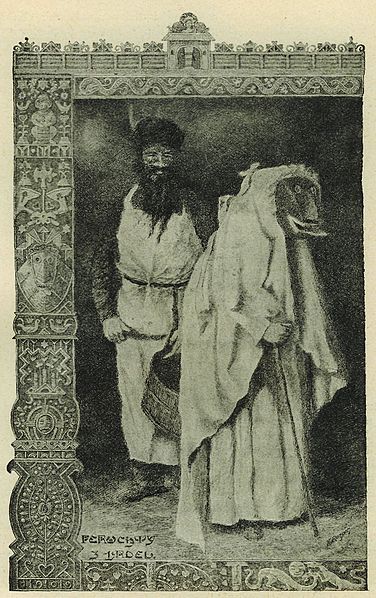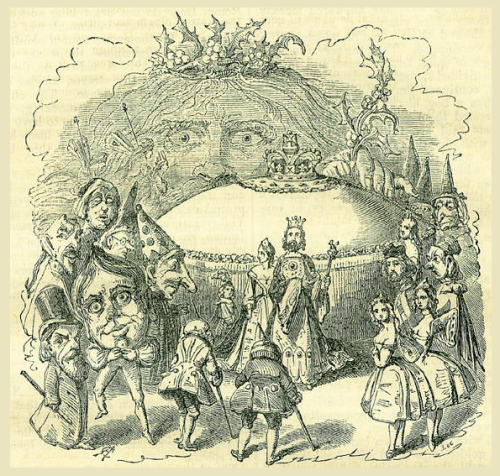whytodayisbrilliant:Why January 5th is BRILLIANTKing for a DayToday, it will be Twelfth Night. The E
whytodayisbrilliant:Why January 5th is BRILLIANTKing for a DayToday, it will be Twelfth Night. The Eve of Epiphany, when the Three Kings are supposed to have visited Jesus. Elsewhere, other Christmas visitors are still expected. In Italy children are expecting Befana. She was the hospitable lady who gave shelter to the Three Kings on their journey. They asked her to join them, but she declined as she had too much sweeping to do. Later, she regretted it. She climbed onto her broomstick and flew off to catch them up. She never found them. So now she flies around Italy on her broomstick on twelfth night looking for good children to give presents to, leaving a lump of coal for the bad ones. Meanwhile, children of the northern Alps would once have considered themselves lucky to get away with only a lump of coal. When we talked about Krampus, we mentioned his female companion Perchta, who was also keeping an eye on their behaviour. Goodness was rewarded with a silver coin. Anything less, particularly failure to spin the correct amount of wool or flax during the year, and you get your belly slit open, your guts pulled out and replaced with straw and pebbles. Adults had a much happier time. Epiphany being the Feast of the Kings, on the preceding evening, anyone at the feast might be elected king for the night. Often the ‘king’ would be chosen by lottery. A large cake would be prepared and a single bean thrown into the batter. When the cake was divided amongst the revellers, whoever got the bean would be ‘King of the Bean’ and everyone had to do what he said. This even happened at royal courts. In 1521, King Francis I of France was injured by snowballs, apples and eggs in a mock battle against the King of the Bean. Tudor king, Henry VII was particularly fond of this tradition. The King and his highest courtiers would become peasants for the evening and some lowly person would be elected 'Lord of Misrule’. He enjoyed it so much he elected an 'Abbot of Unreason’ too. So did James IV of Scotland. King Henry VIII also enjoyed a Lord of Misrule and encouraged university colleges to elect their own. During the short reign of his son, Edward VI, things got a bit out of hand. In 1551/52 his Lord of Misrule, George Ferrers, a court poet, was accompanied by a large entourage. He had his own coat of arms, three pages, eight councillors, a clergyman, a philosopher, an astronomer, a poet, a physician, an apothecary, a master of requests, a lawyer, two gentleman, a couple of jugglers, acrobats and comic friars. He even entertained an ambassador, who spoke gibberish and had an interpretor to translate for him. They were all welcomed to the city by the London Sheriff’s own Lord of Misrule and given an official tour. After his sister Mary, a rather serious Catholic lady, became queen there was no more misruling at the royal court. Mary Queen of Scots though, had a Queen of the Bean for several years.However, the tradition continued at universities, at the Inns of Court and in private mansions. Sometimes the elected king would be lifted up to the ceiling to mark crosses on the rafters in chalk. This was supposed to protect the house from evil. A celebrated seventeenth century chef called Robert May includes in his book 'The Accomplisht Cook’, preparations for a Twelfth Night feast that included a castle and ship made from pastry that fired cannons at each other, a pastry stag filled with claret, to look like blood, egg shells filled with rosewater for people to throw at each other and two pies with live birds and frogs inside. When these were cut open the frogs and birds were supposed to come out. The birds would fly up and the flapping of their wings would blow out the candles, everyone would be left in darkness with the flying birds and hopping frogs. This would, apparently, “cause much delight and pleasure to the whole company.” After the Civil War, people were not so keen on a festival that was all about social upheaval, they’d had enough of it. The feast survived but in a rather more watered down form. The Twelfth Night cakes were still served, and were quite elaborate affairs, up until the nineteenth century. But often the king was chosen by drawing lots from a hat instead. There would be other roles too. People would stay in their allotted character for the rest of the evening. Sometimes, the bean was replaced by various charms baked into the cake which represented fortune in the year ahead. A ring stood for marriage, a thimble for spinsterhood. The tradition eventually became associated with Christmas puddings.If you’re worried because you haven’t taken your Christmas decorations down yet, don’t. The superstition that it is bad luck to leave them up after twelfth night is a relatively recent one. Traditionally they come down at Candlemas, February 2nd. Christmas may be pretty much over for now but, if you live in a place where Mardi Gras is celebrated, tomorrow will be the start of Carnival season. Carnival means 'farewell to meat’, Mardi Gras, 'fat Tuesday’ (pancake day). So it’s time to start partying again and generally making the most of things before Ash Wednesday and the start of Lent. -- source link
Tumblr Blog : whytodayisbrilliant.tumblr.com
#history#twelfth night


